Art on police killings got pulled at Cal State Long Beach. Now UC Irvine takes it on
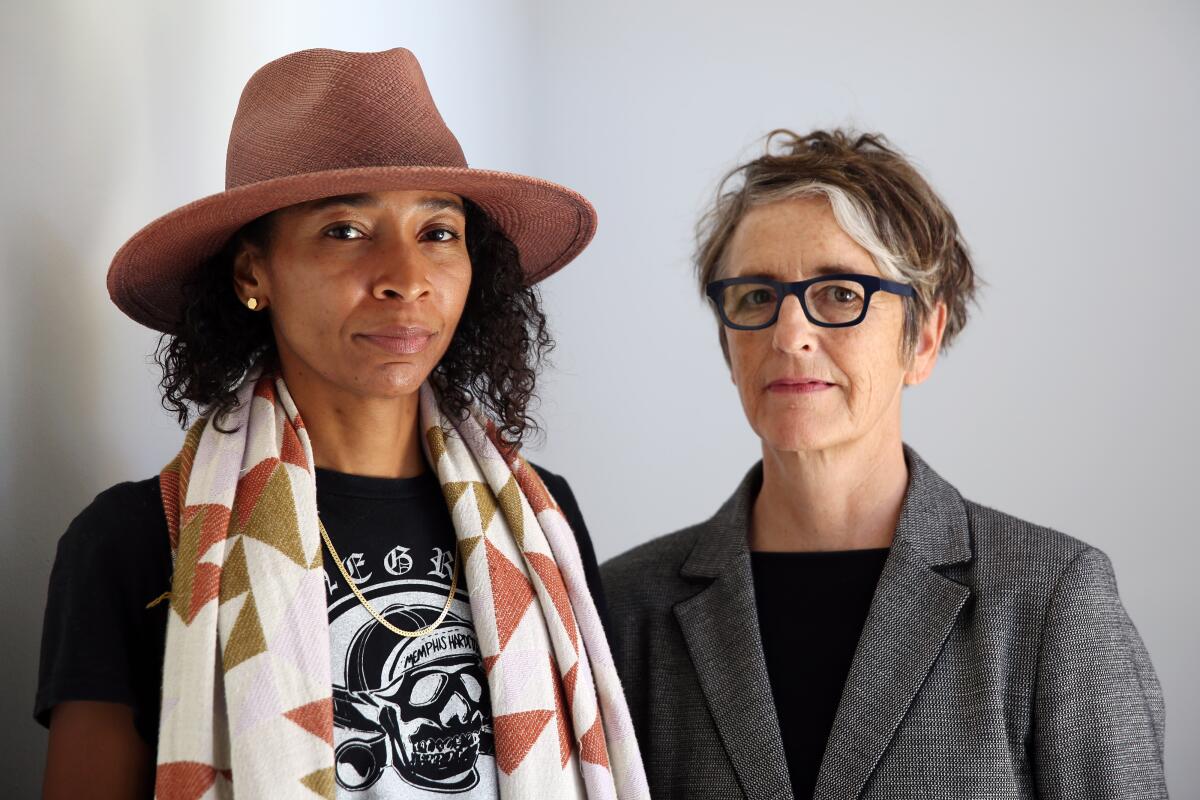
- Share via
Artist lauren woods was en route to complete the installation of her exhibition protesting police brutality against black people at the Cal State Long Beach University Art Museum when she received a flurry of calls and texts. Her key collaborator, Kimberli Meyer, the museum’s director, had been abruptly fired.
Meyer and woods (who uses all lowercase) had worked with students for a year to compile documents related to police violence acquired through the Freedom of Information Act for the exhibition “American Monument.”
Its centerpiece was an interactive sound installation — a grid of 25 turntables that played audio related to black people who died after altercations with police. The cases included Michael Brown, the unarmed 18-year-old killed by Ferguson, Mo., police Officer Darren Wilson in 2014, and Sandra Bland, the 28-year-old pulled over in a routine traffic stop, whose death in a Texas jail cell was ruled a suicide in 2015.
But as woods worked to finish installing “American Monument,” she realized it was impossible to do the work without Meyer, and the opening turned into a protest. The artist silenced the audio installation and halted programming for the duration of its run in Long Beach.
More than a year later, the work was officially “unpaused.”
“American Monument” finally opened with its turntables intact Saturday, this time at a different institution: UC Irvine’s Beall Center for Art + Technology.
Woods has made a few changes to the new iteration of “American Monument,” she said during a preview last week.
The project now highlights 22 cases of police or state-sanctioned violence against black people instead of 25, but the exhibition still features boxes filled with legal documents for each case and enlarged transcripts of testimony from Wilson and George Zimmerman, who shot and killed 17-year-old Trayvon Martin in 2012.
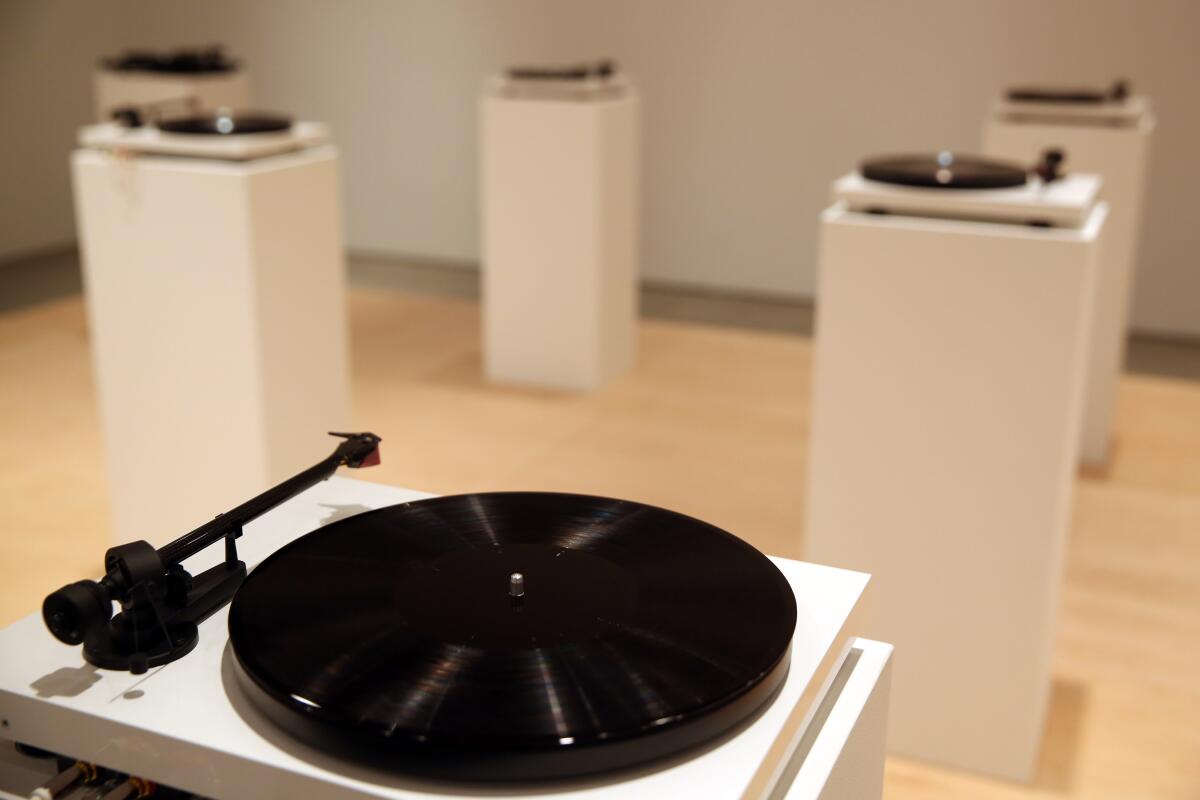
The centerpiece sound installation is reconfigured in the Beall Center’s rectangular space.
Once a needle is dropped on any of the 22 spinning turntables on pedestals, jarring recordings from dashboard cameras, bystander audio, and readings of police reports and court transcripts interrupt the music playing in the background.
Inside the exhibition’s workspace — a room where woods plans to host workshops with the academic community, activists and grass-roots organizations — the artist addressed the Cal State Long Beach conflict, calling Meyer the “architect” of “American Monument.”
“When things happened last year, part of the problem was that it was a complete non-understanding of the project and the process to believe that you can take any component out,” woods said. “So that’s why I’m really excited to be able to come here … and work with this brilliant community.”
Beall Center Artistic Director David Familian was in the audience at the Long Beach opening last year.
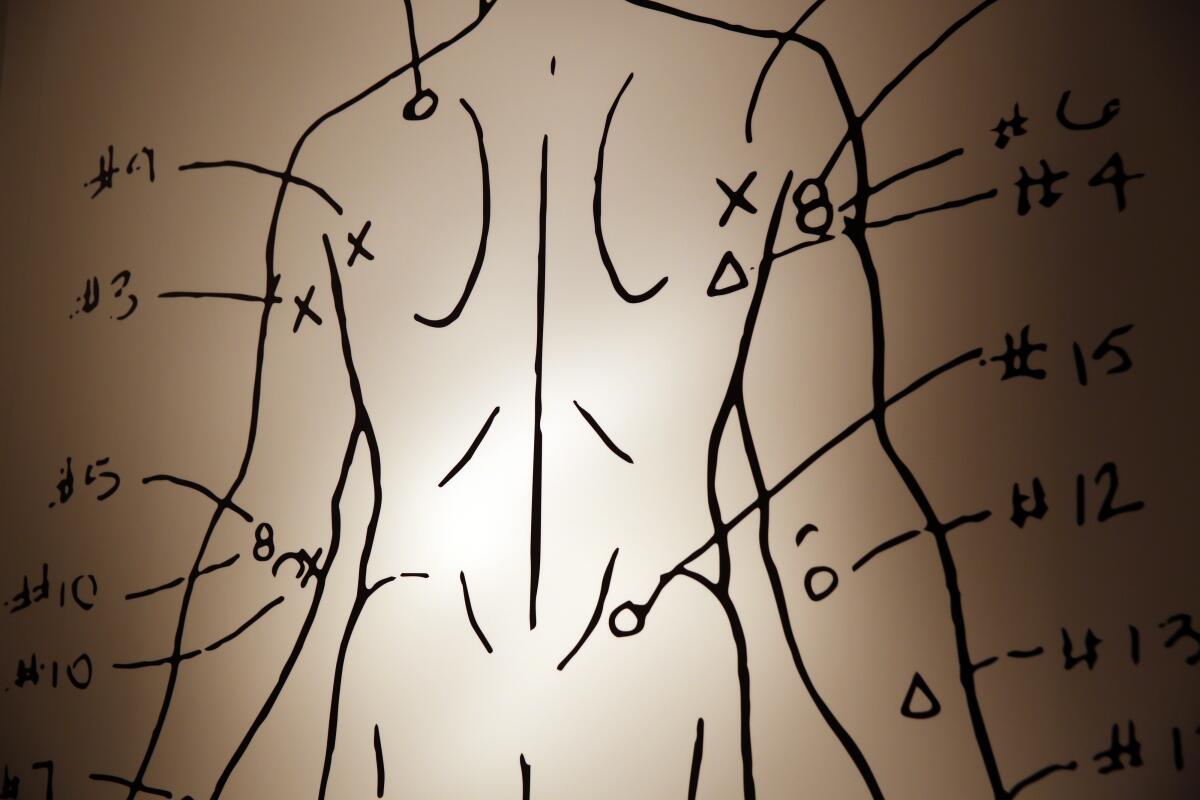
That’s when woods introduced the work, played a short excerpt of the Facebook Live recording of Philando Castile’s death, then announced she was pausing the work. And with the help of a few others, she switched off all the installation’s turntables.
“When lauren played 30 seconds of the work, it etched in our minds,” Familian said.
Meyer said Familian reached out the next day, saying, “I hope you guys get this figured out at Cal State Long Beach, but if you don’t, let me know, because the Beall would love to take it on.”
Meyer, who came to the Long Beach museum in 2016 after serving as director of the MAK Center for Art and Architecture in West Hollywood, envisioned a more social-justice-oriented program at Long Beach. She said her firing was unexpected, and she appealed the university’s decision. Near the end of 2018, “it became clear that that was not going to happen,” Meyer said.
The university still will not give a full explanation of why Meyer was fired. It has indicated the decision was “part of a longer-term process” and not related specifically to woods’ show.
Woods said she had a contentious relationship with Long Beach administration while working on “American Monument” and that firing Meyer was an attempt to suffocate the work.
Paul Baker Prindle, director of Meyer’s former museum, now called the Carolyn Campagna Kleefeld Contemporary Art Museum, said the university was “very pleased to see the exhibition continue in its new iteration and offer Ms. Woods and UC Irvine our congratulations.”
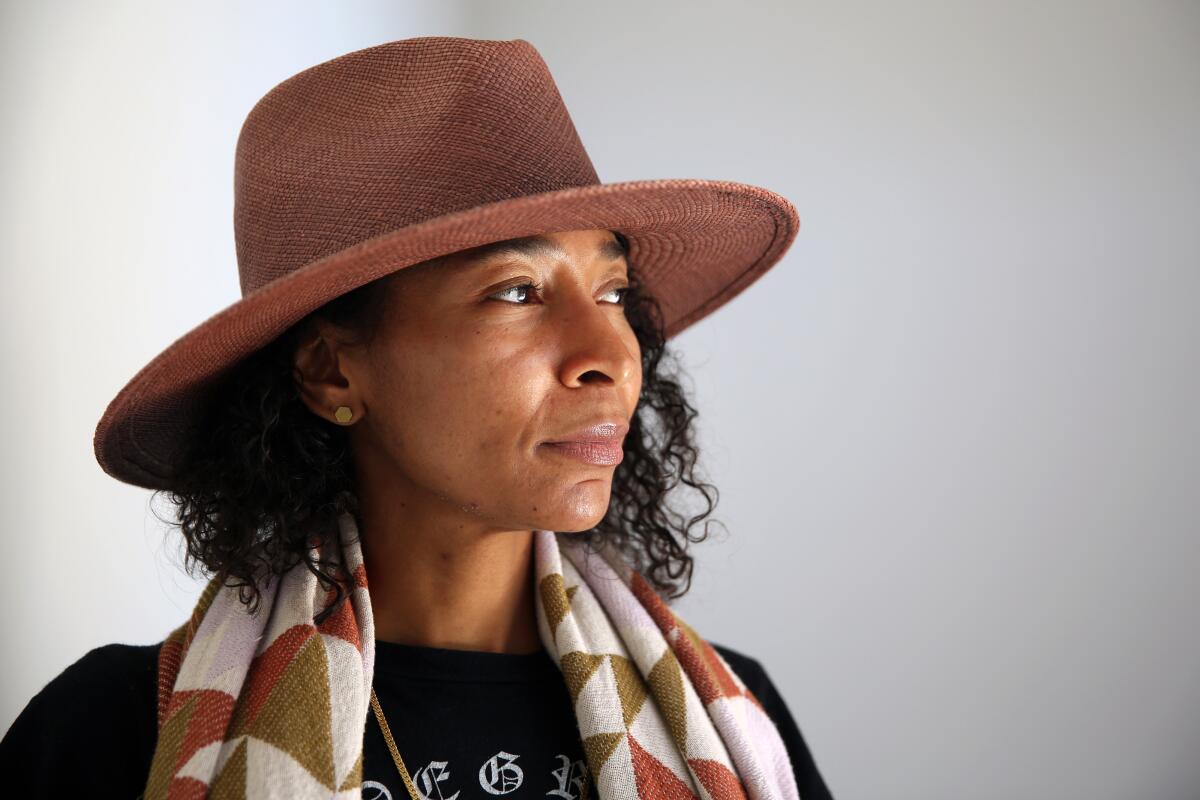
At UCI, getting approval for “American Monument” was a smooth process.
“In every meeting, from faculty all the way up to the chancellor’s office, they go, ‘What’s the problem?’” Familian said. “The chancellor considers us a free speech space, so they were just perplexed what Long Beach had a problem with.”
Although woods received offers from institutions across the U.S., “it was important to keep it in Southern California and in the L.A. region, because we had started building the relationships with different organizations, people and also the students at CSULB,” she said.
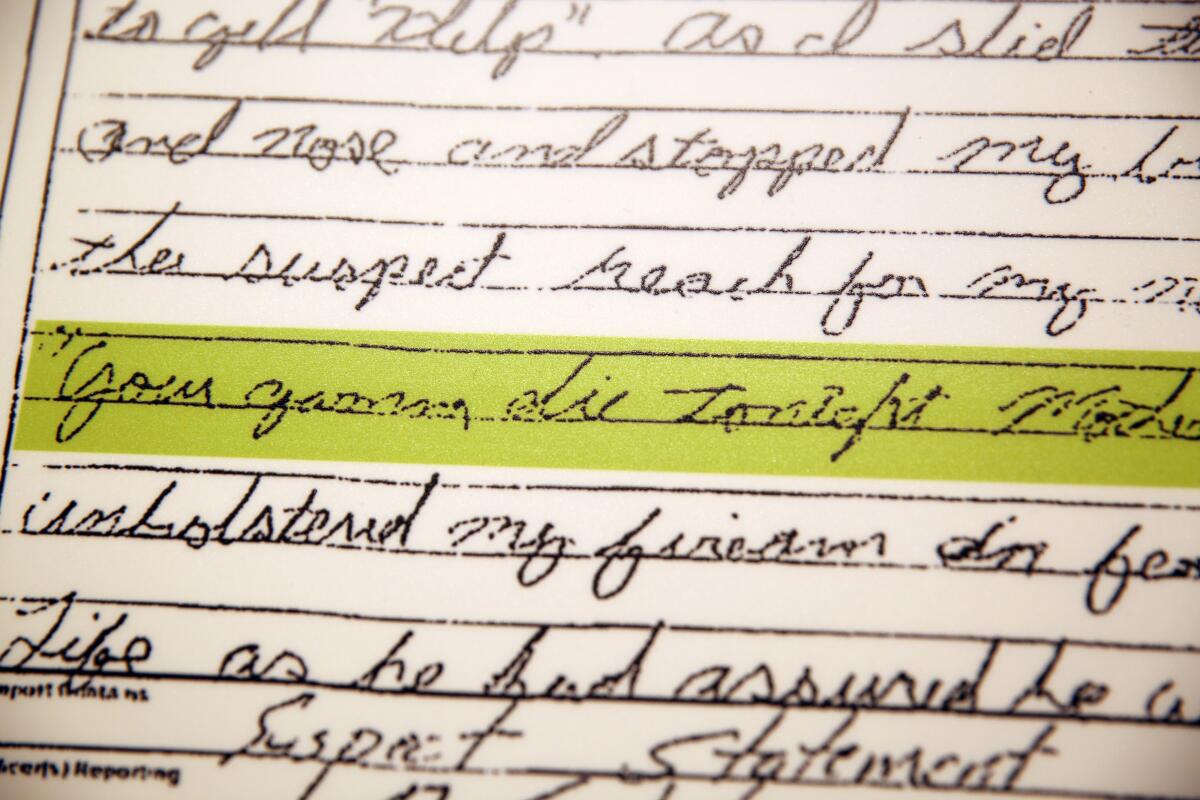
Meyer, who now works as an independent curator, is “still continuing to process what happened at Cal State.” She said she was excited for the project to have a life at UCI.
“American Monument” will evolve after its opening Saturday, as woods and collaborators continue to research about 200 cases and build the exhibition’s display. The completed project will be officially “unveiled” in February.
Although woods said she was ready to do the work, she didn’t feel particularly happy “because the reality is this is about police violence, and it feels really personal to me,” she said. “I shouldn’t have to be doing it.”
The updated project now includes Botham Jean, the Dallas man who was shot and killed in his own apartment in September 2018 by off-duty police Officer Amber Guyger.
On the day of the “American Monument” preview, Guyger was sentenced to 10 years in prison.
“When we added him in, the case was in progress. We thought it would actually go longer,” woods said.
Although the artist obtained the leaked 911 call, she felt it was too sensitive to include in the sound installation, so soon after Jean’s death. If you play his turntable, all you will hear is silence.
IF YOU GO
What: “American Monument”
Where: Beall Center for Art + Technology, 712 Arts Plaza, Irvine
When: Noon to 6 p.m. Mondays through Saturdays through Feb. 8
Tickets: Free
Information: beallcenter.uci.edu
Makeda Easter writes for the Los Angeles Times.
All the latest on Orange County from Orange County.
Get our free TimesOC newsletter.
You may occasionally receive promotional content from the Daily Pilot.




